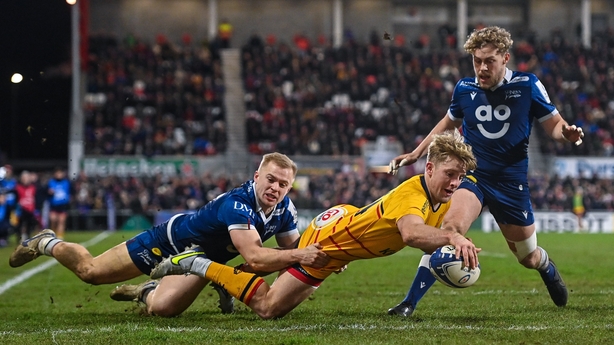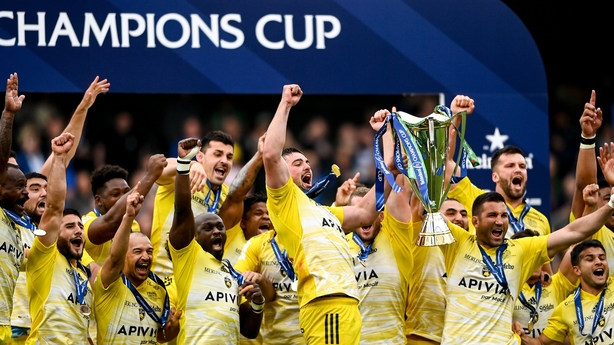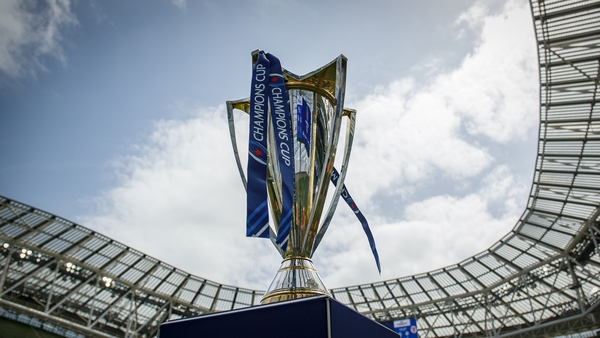A new format for the new season, but one that's no more popular than the last.
Over the past couple of seasons, rugby fans in the northern hemisphere have been pining for the good old days of the Heineken Champions Cup.
With the competition bumped from 20 to 24 teams in recent seasons, and the available game weeks falling from nine to eight in 2022, we won’t see the return of that classic format any time soon unless the French make concessions to their own calendar, an unlikely prospect to say the least.
So here we are, with 24 teams and eight weekends available to crown a champion, and it all starts with Wednesday’s pool stage draw at the Tottenham Hotspur Stadium in London, the venue which will host next season's final.
In last week’s announcement for the revamped Heineken Champions Cup, EPCR chairman Dominic McKay spoke of their goal that "everyone can easily understand, engage with and follow our tournaments". Reaction online to the new layout would suggest they haven’t nailed that brief.
The format of the last three seasons saw two 12-team pools, where each side was assigned two opponents whom they would face home and away in December and January. After that, the top eight teams would advance to the knockout stage.

Its critics pointed to a lack of jeopardy, where two thirds of the competition would still be standing after 48 games, while the larger pools left many fans confused week on week, with each team having different opponents to each other.
For example, last season Ulster faced La Rochelle and Sale Sharks, with Sale Sharks taking on Ulster and Toulouse, and La Rochelle going up against Northampton Saints. It was the fourth round of games before teams really knew which matches mattered beyond their own.
The EPCR listened to the criticisms, but the constraints of the calendar mean that they’ve largely been limited to a rebadging of the tournament rather than a revamp.
On Wednesday afternoon, we’ll see how it all plays out when the draw is made for the pool stage.
The biggest difference is that the large pools of 12 have each been spliced into four six-team groups. Of those six teams, four will advance the knockout stages, fifth place will divert your team into the Challenge Cup, while sixth place leaves your European season over.
The pools will be evenly filled at Wednesday’s draw in London with two teams each from the URC, Premiership and Top14. There will be no pool matches between teams from the same domestic league meaning a URC side will play against the English and French teams in their pool, with two home games and two away games.

To use an example, one possible pool could be: Munster, Glasgow, Racing 92, Toulon, Northampton Saints and Exeter Chiefs. In this scenario, Munster would play one of Racing and Toulon at home and one away, and likewise one home and one away against Saints and Chiefs.
It remains unclear how those fixtures will be divided, and how it will be decided which of a team’s opponents will be at home or away.
"Fixtures will be determined using an algorithm which will take into consideration the pool draws, league calendar restrictions, individual club calendar restrictions and broadcast requirements," a statement from tournament organisers says.
The bigger changes we'll see at the pool stage draw will centre around the seedings, and it has a particular impact on the four Irish provinces.
Teams from the same URC Shield will be kept separate, meaning Munster, Leinster, Connacht and Ulster will be spread across the four pools, rather than having to compete against each other for places in the knockout stages.
On top of that, there will be just two tiers of seeds, rather than four which we’ve seen in previous years.

As winners of their respective leagues, Munster, Saracens and Toulouse have earned top-seed status, along with defending champions La Rochelle.
The remaining 20 teams will be in the second tier, and aside from keeping URC sides from the same country apart, it will effectively be an open draw for the remaining five spots in each pool. The result is that a bit of luck will be needed in tomorrow’s draw. No harm in that.
To give an idea how big a difference that could make, let’s look at Leinster. Having missed out on a top seed, Leo Cullen’s side know they will have to take on one of La Rochelle, Toulouse or Saracens, any one of those a mouth-watering prospect for neutral fans.
Luck of the draw will determine who else they face. On one hand, they could be in a pool with La Rochelle, Racing 92, Sale Sharks, Leicester Tigers and the Stormers, while they could also end up against Stade Francais, Bayonne, Saracens, Bath and Cardiff.
But, with four out of the six teams in each group advancing to knockout rugby, Wednesday’s draw may very well be more exciting than the pool stage itself.
And that’s the issue that will continue to hang over the modern Champions Cup.
2023/24 Heineken Champions Cup qualifiers:
URC: Munster (Tier 1), Leinster, Connacht, Ulster, Stormers, Bulls, Glasgow, Cardiff
Top14: La Rochelle (Tier 1), Toulouse (Tier 1), Racing 92, Bordeaux-Begles, Stade Francais, Lyon, Toulon, Bayonne
Premiership: Saracens: (Tier 1), Sale Sharks, Leicester Tigers, Northampton Saints, Harlequins, Exeter Chiefs, Bath, Bristol Bears
2023/24 season:
Round 1 – 8/9/10 December 2023
Round 2 – 15/16/17 December 2023
Round 3 – 12/13/14 January 2024
Round 4 – 19/20/21 January 2024
Round of 16 – 5/6/7 April 2024
Quarter-finals – 12/13/14 April 2024
Semi-finals – 3/4/5 May 2024
Champions Cup final – Saturday 25 May 2024, Tottenham Hotspur Stadium


